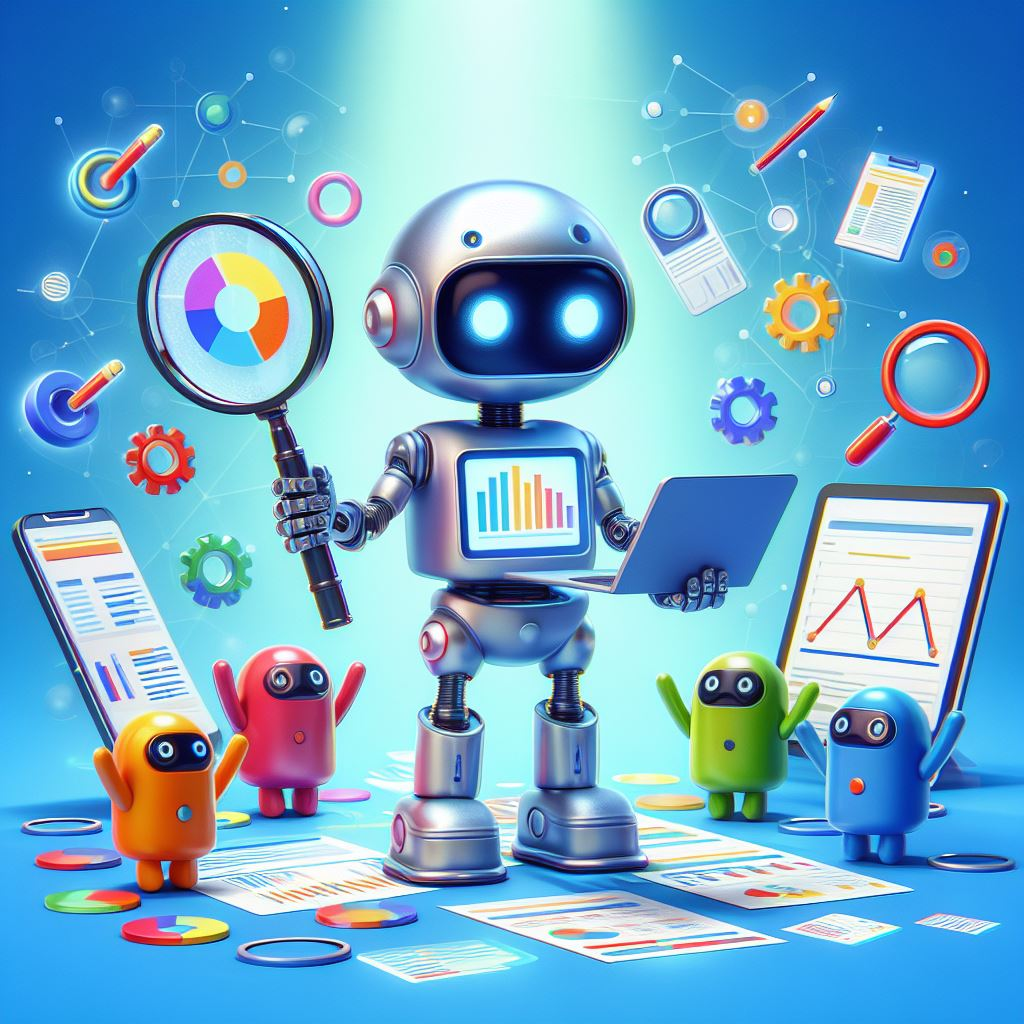The world of marketing is experiencing a blend of artificial intelligence (AI) and search engine optimization (SEO) techniques. This fusion seeks to improve and redefine the strategies used to boost visibility and rankings, on search engines.
Understanding AI in SEO
AI algorithms in SEO sift through data to grasp user intent and behavior, optimizing search results. Machine learning algorithms like natural language processing (NLP) and neural networks enable search engines to interpret search queries, providing relevant outcomes. Tools such as Google RankBrain leverage AI to comprehend the context of searches. Deliver results to users.
Learn more about AI human auto typers. To seize this opportunity simply click on the link provided below.
Benefits of AI in SEO
1.
Enhanced Keyword Research and Analysis: AI-powered tools can pinpoint keywords and trends, aiding businesses in targeting their content effectively.
2.
Improved Content Optimization:
AI systems assess the quality, relevance, and structure of content to enhance website pages for search engines, leading to rankings and increased website traffic.
3. Sophisticated Competitor Analysis: AI tools offer insights into competitors' SEO tactics, empowering businesses to spot opportunities and maintain an edge.
4. Tailored User Experience: AI-driven personalization features enable companies to customize content and recommendations based on user preferences, driving engagement and conversions.
Challenges and Considerations
Despite the benefits of AI, there are challenges and considerations to keep in mind;
Privacy Concerns Regarding Data Usage:
The integration of AI in SEO raises issues surrounding data privacy and security since algorithms analyze user interactions to provide experiences.
Vulnerability to Algorithm Changes:
Depending heavily on AI-powered automation may result in human oversight and creativity in SEO approaches, potentially leading to subpar results.
By examining how users interact and their preferences, these platforms offer product recommendations, which can result in conversion rates and increased sales.
C.
Potential Risks of Excessive Automation Reliance:
Depending heavily on AI-powered automation may result in human oversight and creativity in SEO approaches, potentially leading to subpar results.
By examining how users interact and their preferences, these platforms offer product recommendations, which can result in conversion rates and increased sales.
Enhancing ai-powered SEO for Businesses;
Local establishments like eateries, beauty salons, and retail shops use AI tools like Google My Business and Yelp to enhance online visibility and attract local clientele.
By optimizing business listings, responding to customer feedback, and providing details, these businesses improve their presence in search results while driving foot traffic to their brick-and-mortar stores
Optimizing for Voice Search;
With the evolution of voice-activated devices like Alexa, Amazon, and Google Assistant, businesses are tailoring their content for voice search queries.
AI-powered tools such as AnswerThePublic and SEMrush analyze conversational search queries to assist enterprises in crafting content that effectively addresses user inquiries, increasing their chances of appearing in voice search results.
Businesses in sectors utilize AI-driven tools to assess tactics, spot market trends, and discover fresh opportunities.
Platforms like Ahrefs and SpyFu offer insights into competitor keywords, backlink profiles, and advertising strategies, helping businesses refine their SEO approaches and maintain an edge.
These real-life examples showcase how companies can harness AI-powered SEO to reach their marketing goals, boost organic traffic, and enhance online visibility.
The future of AI-powered SEO
With emerging technologies like voice search optimization, image recognition, and natural language processing reshaping the field.
Companies can anticipate AI's role in SEO strategies, fostering innovation and yielding superior results.
Closing Thoughts
AI-driven SEO presents the potential for businesses to optimize their strategies and secure higher search engine rankings.
By leveraging AI algorithms and resources, companies can enhance keyword research efforts, refine content optimization practices, and offer tailored user experiences. While challenges exist alongside benefits, the advantages outweigh the drawbacks of adopting AI for SEO purposes.
As AI progresses, businesses must embrace this technology to remain competitive.
Frequently Asked Questions
1. What does AI-powered SEO involve?
AI-powered SEO utilizes intelligence (AI) algorithms and machine learning techniques to optimize website content, boost search engine rankings, and enhance the user experience.
2. How does AI influence SEO?
AI algorithms sift through data to grasp user intent, behavior, and preferences, enabling search engines to provide relevant and tailored search results. This aids businesses in boosting visibility, attracting traffic, and strengthening their presence.
3. Can you provide examples of AI tools used in SEO?
Examples of AI tools utilized in SEO include Google RankBrain, which interprets search queries and delivers search outcomes, and platforms like SEMrush and Moz, which leverage AI algorithms for keyword research, content optimization, and competitor analysis.
4. What advantages does AI bring to SEO?
Incorporating AI into SEO offers enhanced keyword research and analysis capabilities, improved content optimization strategies, advanced competitor analysis functionalities, and the ability to create user experiences. These advantages result in higher search engine rankings, increased website traffic volumes, and better conversion rates.
5. What difficulties arise when incorporating AI-driven SEO?
Challenges in implementing AI-powered SEO encompass concerns about data privacy, reliance on algorithm updates, and the danger of automation. Companies must tackle these obstacles by ensuring data protection, keeping abreast of algorithm modifications, and balancing automation and human supervision.
6. How can companies effectively integrate AI-driven SEO?
To effectively deploy AI-powered SEO, companies should select AI tools and platforms that integrate AI into existing SEO strategies and offer training opportunities for their teams to effectively comprehend and leverage AI technologies.
7. What are the upcoming trends in utilizing AI for SEO?
Future trends in using AI for SEO involve emerging technologies like voice search optimization, image recognition, and natural language processing. These advancements are anticipated to influence the landscape of SEO tactics, fostering innovation and yielding results for businesses.


Dont forget to share this post!